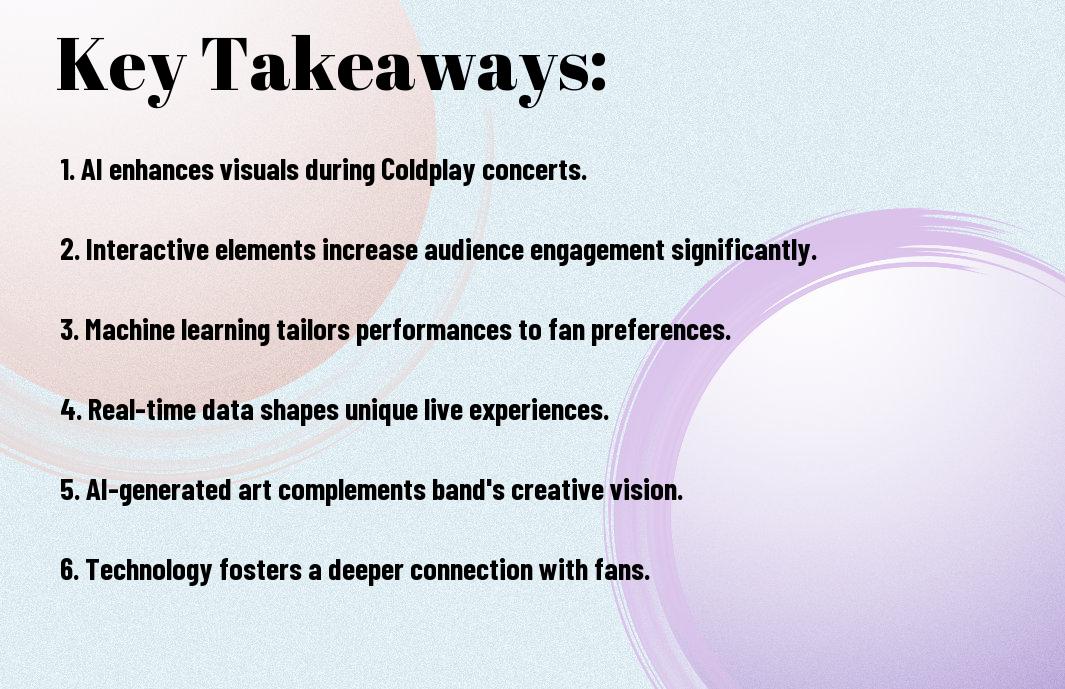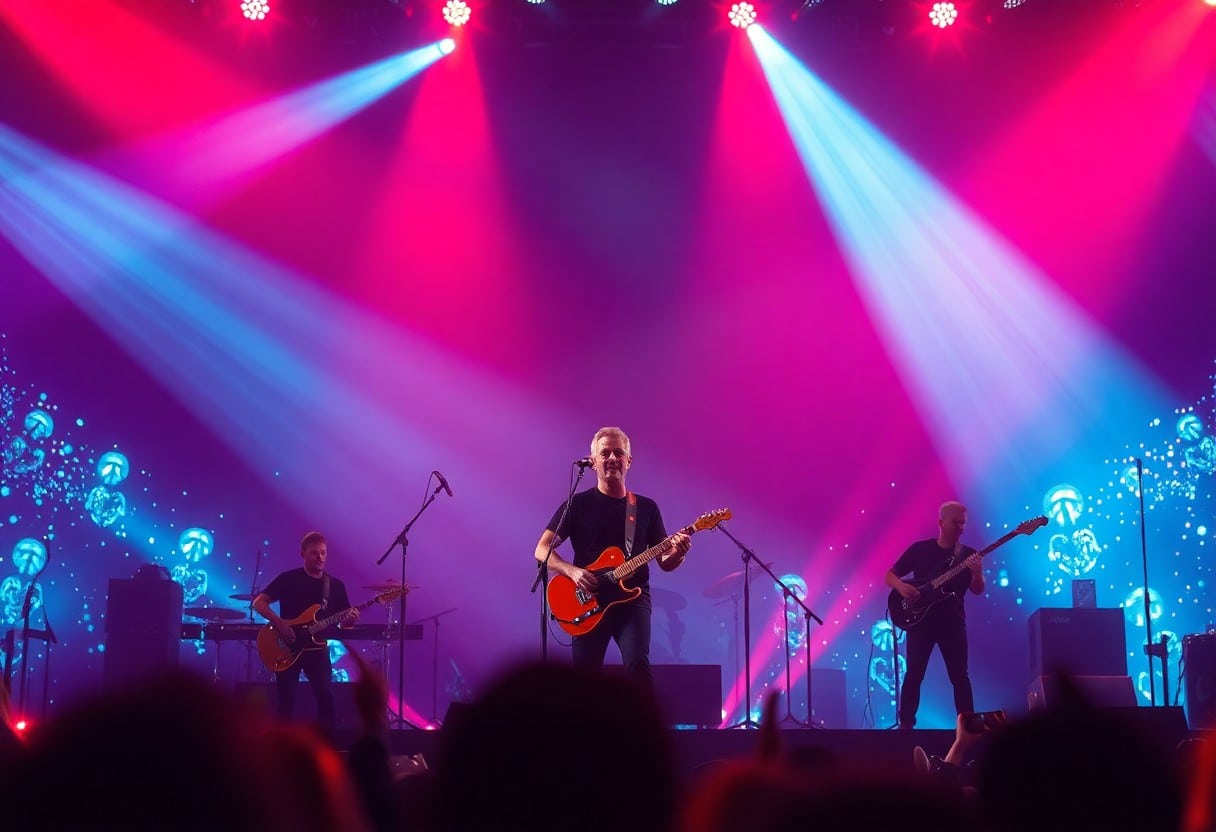It’s fascinating to see how AI technology is transforming live performances, and Coldplay is at the forefront of this revolution. In this blog post, I will explore the innovative ways the band incorporates AI into their shows, enhancing both visual effects and audience interaction. By examining their use of AI-generated visuals and real-time audience engagement, I’ll show you how this technology elevates the concert experience, making each performance unique and unforgettable. Join me as we investigate the intersection of music and technology with Coldplay as our prime example.
The Role of AI in Live Performances
Before plunging into Coldplay’s innovative use of AI, it’s important to recognize how technology has revolutionized live concerts. By integrating artificial intelligence into their performances, Coldplay enhances every aspect, from visuals to sound, creating an immersive experience for the audience. This fusion not only captivates viewers but also allows the band to explore creative avenues previously thought impossible.
Enhancing Visuals with AI Technology
At the forefront of Coldplay’s live shows is the stunning visual display, which is often enhanced by AI technology. This allows for dynamic light shows and projection mapping that react in real-time to the music, ensuring a captivating spectacle that elevates the overall performance and engages the audience on multiple sensory levels.
AI-Driven Sound Engineering
Against conventional methods, Coldplay utilizes AI-driven sound engineering to deliver a polished auditory experience. This innovation enables real-time adjustments to sound levels, instrument balances, and even vocal effects, ensuring that every note resonates perfectly, regardless of the venue’s acoustics.
Performances are transformed as AI algorithms analyze sound patterns and environment acoustics, allowing for personalized tuning of each show. This means that from stadiums to smaller venues, the audio experience remains consistent and high-quality. Moreover, AI technology can predict potential disturbances or feedback issues, enabling sound engineers to address them proactively. Ultimately, AI-driven sound engineering allows Coldplay to focus on their artistry while delivering an exceptional auditory experience to fans worldwide.
AI-Powered Interactivity
You might be surprised to learn how AI is transforming the way audiences experience Coldplay’s live performances. By leveraging advanced algorithms, the band is able to create a highly interactive concert environment that responds to real-time audience feedback, mood, and engagement levels. This means that every show feels uniquely tailored to each audience, enhancing the overall experience and elevating the emotions felt during their performances.
Audience Engagement through AI
An integral part of Coldplay’s live shows is the use of AI to foster deeper connections with the audience. Interactive elements, such as live polls or social media integration, allow fans to influence setlists or engage with the performance in real time, creating a dynamic and collaborative atmosphere that keeps everyone invested.
Personalization of Live Experiences
Before the concert even begins, AI systems analyze various data points to tailor the experience for each attendee. From personalized light shows to customized video displays that resonate with localized themes, the band uses AI to ensure that fans feel a unique connection to the event.
A key factor in the personalization of live experiences lies in the data-driven insights AI tools provide. They assess audience demographics and preferences, allowing Coldplay to adapt their performances accordingly. This might include custom visual elements or thematic surprises that reflect the audience’s cultural background, ultimately making every concert not only a show but a collective memory to cherish. By utilizing AI in this manner, I feel an emotional connection far beyond just spectating; it’s as if I’m participating in a moment crafted specifically for all of us present.
Case Studies of AI Implementations
All around the world, Coldplay has seamlessly integrated AI into their performances, showcasing the potential for innovation in live music. Here are some notable case studies:
- AI-Generated Visuals: In 2019, Coldplay used AI to create dynamic visuals that responded to crowd energy, enhancing the overall concert experience.
- Real-Time Song Adaptation: During a 2021 performance, AI technology adjusted song arrangements based on audience reactions, resulting in a unique concert for each venue.
- Virtual Reality Experiences: Coldplay introduced an AI-driven VR experience at their 2020 tour, allowing fans to immerse themselves in a virtual concert.
Specific Coldplay Concerts
Below is a look at specific Coldplay concerts where AI played an integral role. For instance, the “Music of the Spheres” tour in 2022 featured AI-driven lighting that changed with each song’s mood, enhancing emotional impact and audience interaction.
Comparisons with Other Artists
About exploring AI in live performances, I found that other artists are also leveraging this technology, but Coldplay stands out for its unique implementations. Here’s a comparison of AI use in live concerts:
AI Implementations in Live Concerts
| Artist | AI Usage |
|---|---|
| Coldplay | Dynamic visuals, real-time adaptations, and VR experiences |
| Björk | Immersive soundscapes with AI-generated audio |
| U2 | Setlist adaptations based on audience data |
But diving deeper, I see that Coldplay’s commitment to using AI transcends conventional applications. Their focus on audience engagement through real-time adaptations sets them apart from other artists. Here’s further analysis of AI technology in various performances:
Advanced AI Usage in Concerts
| Artist | Innovative Techniques |
|---|---|
| Coldplay | AI-adjusted arrangements; emotion-driven visuals |
| Billie Eilish | Interactive audience feedback for song choices |
| Ariana Grande | AI in choreography and visual effects |
Challenges and Limitations of AI in Live Music
Unlike the seamless integration many envision, AI in live performances like Coldplay’s presents notable challenges. Technical limitations, ethical dilemmas, and audience reception can all hinder the potential of AI to enhance a live music experience. Understanding these issues is vital for anyone exploring the intersection of technology and performance.
Technical Hurdles
Hurdles in technology can significantly impact AI’s functionality during live performances. Latency issues, audio quality inconsistencies, and the unpredictability of live environments create obstacles that can undermine the seamlessness you aspire to achieve. As I research into this digital realm, it’s important to recognize these barriers that artists face.
Ethical Considerations
Among the challenges of incorporating AI in live music are the ethical considerations that arise. There are concerns regarding copyright, ownership, and the authenticity of an artist’s work when AI-generated elements enter the equation.
Also, I must consider the implications of using AI-generated content versus traditional performances. When we allow technology to write lyrics or compose melodies, questions about artistic integrity and originality come to the forefront. This raises the issue of whether AI complements or competes with human creativity, prompting critical discussions about authorship in an era where machines can mimic human artistry.
Future of AI in Music and Live Performances
To embrace the future of AI in music, I believe we will witness even greater innovation and integration in live performances. With advancements in AI technology, artists can create unique experiences that captivate audiences. However, as shown in When AI gets it wrong : r/Coldplay, there are challenges to overcome, particularly in balancing creativity and authenticity.
Emerging Trends
One significant trend is the utilization of AI-generated music and visuals, which are increasingly becoming part of the live performance experience, allowing artists to push creative boundaries. Enhanced interactivity through AI tools can engage audiences in real-time, making performances more dynamic and personalized.
Predictions for Coldplay and Beyond
Across the music landscape, I foresee Coldplay pioneering new ways to incorporate AI into their live shows, potentially blending real-time audience feedback to modify setlists or visual experiences. This would not only heighten engagement but also redefine how we experience live music.
Performances might also evolve into collaborative art forms, where AI assists musicians in creating new compositions on the fly. Imagine a Coldplay concert where AI harmonizes with their sound, adapting to the energy of the crowd. As technology progresses, I anticipate artists will increasingly rely on AI, allowing them to express their creativity in previously unimaginable ways while keeping their human touch intact.
Summing up
Following this exploration of AI in Coldplay’s live performances, I can appreciate how technology enhances not only the visual and auditory experience but also the emotional connection with the audience. You may find that incorporating AI elements, such as interactive visuals and real-time data, deepens your engagement during the show. As I witness this integration, it’s evident that Coldplay is setting a precedent, blending artistry with innovation, inviting us all to reimagine what a concert can be.





No Comments